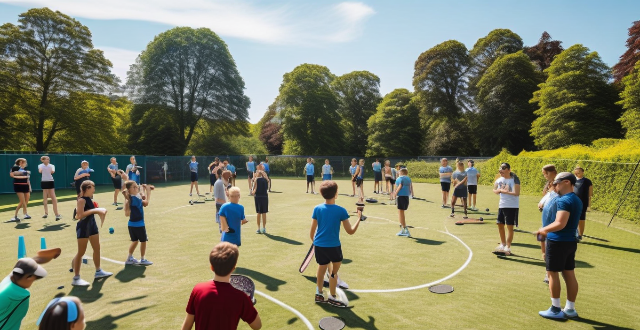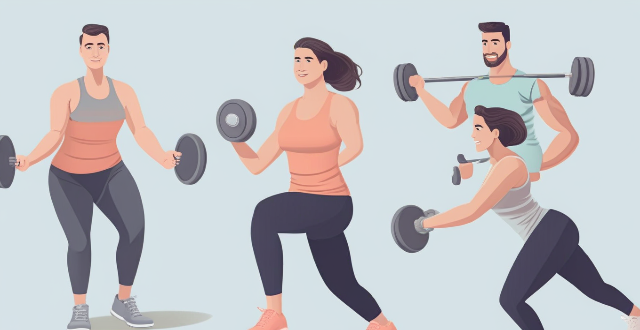Cognitive Fitness

Is there a link between physical fitness and cognitive function ?
The text discusses the potential link between physical fitness and cognitive function, citing research that suggests a correlation. It defines physical fitness as the ability to perform aspects of sports or occupations, obtained through proper nutrition, exercise, and rest, and cognitive function as mental processes involving perceiving, remembering, reasoning, problem-solving, understanding, judging, and learning. The text mentions studies that suggest enhanced physical fitness can improve cognitive function in older people without known cognitive impairment and that physical fitness could be a better predictor of cognitive performance than physical activity. It also discusses potential mechanisms behind the relationship, including increased blood flow to the brain and the release of chemicals that promote cell growth, improvement, and survival. Finally, it notes the potential implications of this research for individual and societal health.

Is there a specific type of exercise that is most effective for enhancing cognitive abilities ?
Exercise has been shown to have numerous benefits on cognitive abilities, but is there a specific type of exercise that is most effective? Aerobic exercise improves blood flow and reduces stress, while resistance training boosts BDNF levels and enhances executive function. Combination exercises provide a comprehensive workout for the body and brain. Finding an exercise routine that you enjoy and can stick to is key to reaping the cognitive benefits over time.

Does exercise have different effects on cognitive function at different ages ?
This article explores the relationship between exercise and cognitive function across various age groups. It highlights the benefits of exercise for children's cognitive development, adults' reduced risk of cognitive decline, and older adults' slowed cognitive decline. Examples of suitable exercises for each age group are provided, including playing sports for children, aerobic activities for adults, and walking or cycling for older adults. The article concludes that incorporating physical activity into daily routines at any age is crucial for maintaining cognitive health and overall well-being.

How long after starting an exercise routine can improvements in cognitive function be expected ?
The text discusses the timeline for improvements in cognitive function after starting an exercise routine. It mentions that immediate benefits such as enhanced mood, improved attention and focus, and increased energy levels can be noticed within 1-3 months. Mid-term benefits like enhanced memory retention, improved executive function, and increased creativity can be observed within 3-6 months. Long-term benefits such as slowed cognitive decline, reduced risk of cognitive disorders, and sustained improvements in overall cognitive performance can be achieved after six months or longer. The text emphasizes the importance of maintaining a consistent exercise regimen over the long term for sustained enhancements in various aspects of cognitive function.

Is there a connection between physical fitness levels and academic performance in children ?
This text discusses the potential correlation between physical fitness levels and academic achievement in children, highlighting research findings that suggest a positive relationship. It outlines various mechanisms through which physical activity may improve cognitive functions and behavior, leading to better academic performance. The text also emphasizes the importance of incorporating physical education into school programs and encourages family and community involvement in promoting physical activities among children.

How does exercise improve cognitive function ?
Exercise plays a crucial role in enhancing cognitive function, including memory, attention, and problem-solving skills. It promotes brain plasticity, increases blood flow and oxygenation, reduces inflammation, and improves sleep quality. Incorporating exercise into your routine can be done through various activities such as running, swimming, or yoga. Start small and gradually increase intensity and duration, find enjoyable activities, incorporate mindful movement, make it social, set realistic goals, and consult with a professional if needed.

How important is sleep for optimizing concentration and cognitive functions ?
The article discusses the significance of sleep for enhancing concentration and cognitive functions. It states that adequate sleep is crucial for improving attention span, alertness, memory consolidation, learning capacity, problem-solving abilities, and decision-making skills. The benefits of getting enough sleep include improved productivity, better performance, reduced stress levels, and enhanced mood. Therefore, prioritizing sleep as part of a healthy lifestyle is essential to optimize concentration and cognitive functions.

Can exercise reverse cognitive impairment caused by neurological disorders ?
Exercise may help reverse cognitive impairment caused by neurological disorders. Studies have shown that exercise can improve cognitive function in people with Alzheimer's disease, Parkinson's disease, and stroke. Exercise may also reduce inflammation, improve balance and mobility, and increase overall quality of life for people with neurological disorders. More research is needed to fully understand the effects of exercise on cognitive impairment caused by neurological disorders.

How does exercise influence neuroplasticity and cognitive function ?
Exercise has a positive impact on neuroplasticity and cognitive function by increasing blood flow, releasing growth factors, reducing inflammation, improving attention and concentration, enhancing memory, and slowing cognitive decline. Incorporating regular physical activity into your lifestyle can have numerous benefits for your brain health and overall well-being.

Is there a relationship between exercise and cognitive function ?
Exercise is a potential intervention for enhancing cognitive function across the lifespan. The relationship between exercise and cognitive function is complex and multifaceted, involving various aspects of cognition and different types of exercise. Long-term exercise interventions have consistently shown positive effects on cognitive function, particularly in older adults. Different types of exercise may influence specific cognitive functions differently, and the underlying mechanisms behind these effects are still being explored. By incorporating regular physical activity into our daily routines, we can potentially enhance our cognitive function and overall well-being.

Can regular exercise prevent cognitive decline in older adults ?
Regular exercise may help prevent cognitive decline in older adults by promoting neuroplasticity, improving blood flow to the brain, and reducing inflammation. Multiple studies have found positive associations between physical activity and cognitive function in this age group. Guidelines recommend aerobic exercise, resistance training, and activities that improve flexibility and balance. Making exercise a regular part of daily life is key for maintaining cognitive benefits over time.

How does physical activity affect children's cognitive development ?
This article discusses the positive impacts of physical activity on children's cognitive development, including improved attention and memory, enhanced executive functioning, increased learning abilities, reduced stress and anxiety, and promoted socialization and teamwork skills. Regular exercise can enhance blood flow to the brain, strengthen neural connections in the prefrontal cortex, stimulate neurogenesis, release endorphins, and provide a healthy outlet for releasing energy and emotions. Encouraging children to engage in regular physical activity can have long-lasting positive effects on their overall well-being and success throughout life.

How does exercise affect brain function and cognitive abilities ?
This article discusses how regular physical activity positively impacts brain function and cognitive abilities by improving blood flow, boosting neurotrophic factors, enhancing plasticity, and reducing inflammation. It emphasizes the importance of incorporating exercise into one's lifestyle for maintaining and enhancing cognitive health.

What are the implications of cognitive development theories in educational psychology ?
Cognitive development theories have significant implications in educational psychology. These theories help educators understand how children think, learn, and process information. By applying these theories, educators can create effective learning environments that cater to the cognitive needs of their students. Piaget's theory suggests that children progress through four stages of cognitive development and emphasizes the importance of hands-on activities and constructivist learning. Vygotsky's sociocultural theory highlights the role of social interaction and cultural tools in cognitive development. Information processing theory focuses on working memory, cognitive load, and metacognition. By understanding these theories, educators can enhance student learning and promote cognitive growth.

Can exercise compensate for poor sleep quality in terms of cognitive function ?
The article discusses the importance of sleep for cognitive function and whether exercise can compensate for poor sleep quality. While exercise has benefits for cognitive function, it cannot fully replace the memory consolidation and emotion processing that occurs during sleep. Chronic sleep deprivation can lead to long-term changes in brain structure and function that may not be reversible through exercise alone. To maintain optimal cognitive function, both regular physical activity and good sleep habits are essential.

What role does exercise play in maintaining cognitive function in old age ?
Exercise is crucial for maintaining cognitive function in old age, with benefits including improved blood flow, reduced inflammation, and increased neuroplasticity. Aerobic exercise, resistance training, and activities like yoga and tai chi are all beneficial. Incorporating physical activity into your daily routine can help keep your mind sharp as you age.

Is it necessary for employers to provide fitness facilities or subsidize gym memberships ?
As the importance of physical health and wellness becomes increasingly recognized, many employees are looking for ways to maintain an active lifestyle. One option that has gained traction in recent years is for employers to provide fitness facilities or subsidize gym memberships as part of their employee benefits package. Providing fitness facilities or subsidizing gym memberships can help employees stay healthy and energized, which can lead to increased productivity at work. Studies have shown that regular exercise can reduce fatigue, improve mood, and enhance cognitive function, all of which can contribute to better job performance. Offering fitness perks can also be a powerful tool for attracting and retaining top talent. In today's competitive job market, companies need to offer unique benefits that set them apart from their competitors. By providing access to fitness facilities or subsidizing gym memberships, employers can demonstrate a commitment to their employees' well-being and create a positive work culture that fosters loyalty and engagement. While the initial investment in setting up a fitness facility or subsidizing gym memberships may be significant, there are potential long-term cost savings to consider. By promoting a healthy lifestyle among employees, employers may be able to reduce healthcare costs associated with chronic diseases related to poor diet and lack of exercise. Additionally, reducing absenteeism due to illness or injury can also save money in the long run. However, one of the main concerns about providing fitness facilities or subsidizing gym memberships is the cost. Depending on the size of the company and the scope of the program, implementing such benefits can be expensive. Employers must weigh the potential benefits against the financial implications before making any decisions. Another challenge is ensuring that the program is accessible and convenient for all employees. If the company is located in a remote area or has multiple locations, it may not be feasible to provide on-site fitness facilities or subsidize gym memberships at nearby clubs. Additionally, some employees may prefer working out at home or participating in outdoor activities rather than using a gym. Employers must also consider legal issues when implementing fitness programs. For example, they should ensure that any fitness facilities comply with local building codes and safety regulations. They should also be aware of potential liability issues if employees sustain injuries while participating in company-sponsored fitness activities. In conclusion, while it is not absolutely necessary for employers to provide fitness facilities or subsidize gym memberships, doing so can offer several benefits including increased productivity, improved retention and recruitment efforts, and potential cost savings over time. However, employers must carefully consider the financial implications, logistical challenges, and legal considerations before implementing such programs. Ultimately, whether or not to offer these benefits will depend on each individual company's unique circumstances and priorities.

Are fitness trackers worth the investment ?
Fitness trackers can provide motivation, data collection, convenience, community support, and customization. However, they also come with potential drawbacks such as cost, inaccuracy, dependency, overemphasis on quantification, and battery life issues. The decision to invest in a fitness tracker should be based on individual needs and priorities.

What certifications should I get as a fitness instructor ?
To become a certified fitness instructor, it's crucial to obtain essential certifications like CPR/AED, personal training, group fitness instruction, and specialty areas of interest. Participating in continuing education will help you stay current and relevant in your field.

Does exercise influence emotional regulation and mental well-being, which in turn affects cognitive processes ?
The article explores the relationship between exercise, emotional regulation, mental well-being, and cognitive processes. It suggests that regular physical activity can positively impact emotional regulation by reducing stress levels, improving self-esteem, and providing a healthy outlet for negative emotions. Exercise also contributes to improved mental well-being by alleviating symptoms of depression and anxiety, promoting relaxation, and providing opportunities for social interaction. These factors, in turn, influence cognitive processes such as attention, memory, problem solving, and decision making. Overall, the article concludes that incorporating exercise into daily routines can have numerous benefits for overall health and well-being.

Can team sports or group exercises provide additional cognitive benefits compared to individual activities ?
Team sports and group exercises provide cognitive benefits such as improved social skills, enhanced cognitive functioning, increased self-esteem and confidence, and personal growth opportunities. Participating in these activities helps individuals develop strong communication skills, cooperation, conflict resolution abilities, attention and focus, decision making skills, memory retention, and a sense of achievement. These skills can be applied in all aspects of life, leading to personal growth and development.

What are the fitness secrets of celebrity athletes ?
Celebrity athletes maintain their exceptional physical abilities and impressive performances in their respective sports through various fitness strategies, including consistency and discipline, high-intensity training, strength training, proper nutrition, and adequate recovery time. These principles can be applied by anyone looking to improve their fitness level and achieve their goals.

What kind of training does a fitness instructor need ?
To become a fitness instructor, one needs a high school diploma or equivalent, certification programs like Certified Fitness Instructor (CFI), specialized certifications, practical skills in anatomy, physiology, first aid, teaching and communication. Continuing education is important to stay updated with trends and research. Personal qualities such as passion for health, patience, empathy, leadership, and motivational skills are crucial. Business and marketing skills including client relations management and social media presence are also necessary.

Are certain durations or intensities of exercise more beneficial for cognition than others ?
Exercise has been shown to improve cognitive function, memory, and mental health. Both short-term and long-term exercise can enhance different aspects of cognition. Moderate-intensity exercise is most beneficial for older adults, while high-intensity exercise may also be advantageous but should not exceed certain levels. Aerobic exercise, resistance training, and balance exercises all contribute to cognitive improvement. Individual differences should be considered when determining the optimal exercise regimen for cognitive enhancement.

How do I choose the right sports equipment for my fitness level ?
When selecting sports equipment, consider your fitness level to avoid injury and maximize workouts. Assess your fitness level (beginner, intermediate, advanced), identify goals (strength training, cardiovascular health, flexibility/balance), and prioritize ease of use, comfort, safety, budget, research, trial before purchase, and space considerations for effective and safe exercise.

Can you suggest any healthy snack options for my fitness meal plan ?
The text provides a summary of healthy snack options for a fitness meal plan, including fresh fruits, nuts and seeds, Greek yogurt, vegetable sticks with hummus, and whole grain crackers with cheese. It emphasizes the importance of choosing nutritious snacks that contribute to overall fitness goals while satisfying cravings and keeping portion sizes in mind.

How does sports education impact academic performance and cognitive abilities ?
Sports education has a positive impact on academic performance and cognitive abilities by improving attention, concentration, learning abilities, reducing stress levels, enhancing time management skills, and increasing discipline and responsibility.

What are the best fitness instructor courses available ?
This article provides an overview of the best fitness instructor courses available, including certifications offered by the National Academy of Sports Medicine (NASM), American College of Sports Medicine (ACSM), International Sports Sciences Association (ISSA), Aerobics and Fitness Association of America (AFAA), and Yoga Alliance. The duration, cost, and accreditation of each course are also discussed.

Can I take online fitness instructor courses ?
Yes, you can definitely take online fitness instructor courses. In fact, there are many reputable organizations that offer online certification programs for aspiring fitness instructors. Here are some key points to consider: ## Benefits of Online Fitness Instructor Courses 1. **Flexibility**: Online courses allow you to learn at your own pace and on your own schedule. This is especially beneficial for those who have other commitments such as work or family responsibilities. 2. **Cost-effective**: Online courses are often more affordable than traditional in-person training programs. You can save money on travel expenses and accommodation costs. 3. **Wide range of options**: There are numerous online fitness instructor courses available, covering various areas of expertise such as yoga, Pilates, strength training, and more. 4. **Access to expert trainers**: Many online courses are taught by experienced and certified fitness professionals who share their knowledge and expertise through video lectures, interactive quizzes, and practical assignments. 5. **Continuous learning**: Online courses provide an opportunity for continuous learning and development. You can revisit the course materials anytime and stay up-to-date with the latest trends and techniques in the fitness industry. 6. **Career advancement**: Completing an online fitness instructor course can enhance your resume and open up new career opportunities within the fitness industry. ## How to Choose an Online Fitness Instructor Course When selecting an online fitness instructor course, consider the following factors: - **Accreditation**: Ensure that the course is accredited by a reputable organization or institution. This will ensure that the program meets industry standards and provides valuable credentials upon completion. - **Course content**: Check the course outline and make sure it covers all the necessary topics related to fitness instruction, including anatomy, physiology, exercise techniques, programming, and safety guidelines. - **Instructor qualifications**: Look for courses taught by experienced and certified fitness professionals who have a proven track record in the industry. - **Learning resources**: Ensure that the course provides access to high-quality learning resources such as video lectures, e-books, practice exercises, and interactive quizzes. - **Support and feedback**: Choose a course that offers regular support and feedback from instructors or mentors throughout the program. - **Community engagement**: Look for courses that provide opportunities for engagement with other students and fitness professionals through forums, discussion groups, or social media platforms. - **Pricing**: Compare the pricing of different online fitness instructor courses and choose one that fits your budget while offering quality education and resources.

What is the role of a fitness instructor in a gym ?
A fitness instructor is responsible for guiding and motivating gym members to achieve their fitness goals. Their roles include designing customized workout plans, providing personal training sessions, leading group fitness classes, educating members on health and fitness topics, and maintaining a clean and safe environment. The ultimate goal of a fitness instructor is to help members reach their fitness objectives and improve their overall health and well-being.